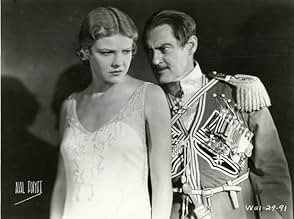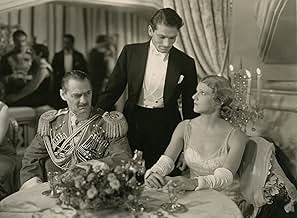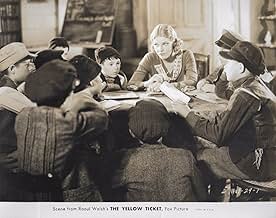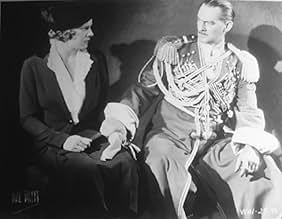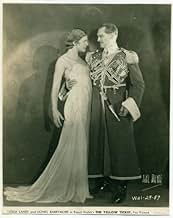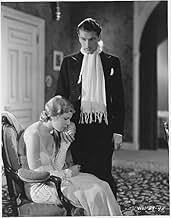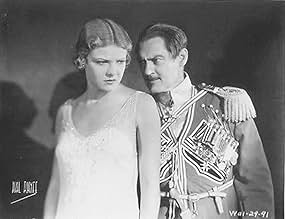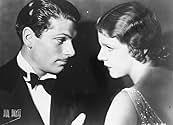Ajouter une intrigue dans votre langueA young Russian girl is forced into a life of prostitution in Czarist Russia, and she and a British journalist find their lives endangered when she reveals to him information regarding the s... Tout lireA young Russian girl is forced into a life of prostitution in Czarist Russia, and she and a British journalist find their lives endangered when she reveals to him information regarding the social crimes rampant in her country.A young Russian girl is forced into a life of prostitution in Czarist Russia, and she and a British journalist find their lives endangered when she reveals to him information regarding the social crimes rampant in her country.
- Réalisation
- Scénario
- Casting principal
- Récompenses
- 1 nomination au total
Oscar Apfel
- British Embassy Butler
- (non crédité)
Frederick Burt
- Minor Role
- (non crédité)
Emile Chautard
- Headwaiter
- (non crédité)
Gilbert Emery
- Sir Hubert, British Ambassador
- (non crédité)
Ruth Feldman
- Woman at Passportcheck
- (non crédité)
Esther Howard
- Prisoner
- (non crédité)
Boris Karloff
- Drunken Orderly
- (non crédité)
Henry Kolker
- Passport Clerk
- (non crédité)
Anne Kunde
- Prison Matron
- (non crédité)
Ivan Linow
- Wrestler
- (non crédité)
Avis à la une
Another gem I have never heard of. I am also unfamiliar with the talents of Elissa Landi. I am glad to have become acquainted with both!
Landi plays a Jewish woman living in oppressed Russia in 1913. She wants to travel to be with her father who is dying in a prison. But all Jews are being watched and aren't allowed passports to travel. Landi finds out that there is a thing called a "yellow ticket" that is given to prostitutes in order for them to travel freely. So she registers as one, not thinking about any consequences this may have. She gets to the prison too late. Her father has died.
But now that she is "registered" as a prostitute, she can't find work. Her family is informed and they shun her. She can't stay and live where she is, and she can't go home.
Even though she remains "a good girl", all the officers and cads know she has a yellow ticket and assume what she is and expect her to "put out". Barrymore plays a sleazy Czar who makes her life miserable. Finally, Olivier comes along and tries to save her. He is a reporter from London looking for stories on the "real" Russia. She provides lots of information and they end up falling for each other.
Barrymore, however, is out to get her. He wants the bad but true stories in the world's papers about Russia to stop and he knows Landi is behind what Olivier is writing and publishing. He captures Landi and gives her a choice of ending the relationship and her aid to Olivier or be responsible for Olivier's death or give her self over to Barrymore for one disgusting night.
Landi does a great job as the victim being used and torn by society, politics, and the morals of the period. Great job and a very entertaining film.
Be classy and check it out!
Landi plays a Jewish woman living in oppressed Russia in 1913. She wants to travel to be with her father who is dying in a prison. But all Jews are being watched and aren't allowed passports to travel. Landi finds out that there is a thing called a "yellow ticket" that is given to prostitutes in order for them to travel freely. So she registers as one, not thinking about any consequences this may have. She gets to the prison too late. Her father has died.
But now that she is "registered" as a prostitute, she can't find work. Her family is informed and they shun her. She can't stay and live where she is, and she can't go home.
Even though she remains "a good girl", all the officers and cads know she has a yellow ticket and assume what she is and expect her to "put out". Barrymore plays a sleazy Czar who makes her life miserable. Finally, Olivier comes along and tries to save her. He is a reporter from London looking for stories on the "real" Russia. She provides lots of information and they end up falling for each other.
Barrymore, however, is out to get her. He wants the bad but true stories in the world's papers about Russia to stop and he knows Landi is behind what Olivier is writing and publishing. He captures Landi and gives her a choice of ending the relationship and her aid to Olivier or be responsible for Olivier's death or give her self over to Barrymore for one disgusting night.
Landi does a great job as the victim being used and torn by society, politics, and the morals of the period. Great job and a very entertaining film.
Be classy and check it out!
Raoul Walksh was never a favourite of mine, I often found his pictures revolting in character and almost inhuman, and this is a particularly disturbing story but the more important for its ruthless realism. It deals with prostitution in tzarist Russia the year before the first world war, it exposes an abyss of social problems and abuse, as the main character Marya Kalish (Elissa Landi) and her family are Jewish and exposed to the tzar's pogroms. Her father ends up in jail and is placed in a dungeon in St. Petersburg, where he gets ill, and the only way for his only daughter to visit him is to acquire a "yellow ticket", a passport for prostitutes, which allows them to go around everywhere, while they have to regularly report to the police. She only avails herself of the ticket to visit her father and never works as a prostitute, although she is troubled enough especially by militaries and Lionel Barrymore as the abominable chief of police. In a critical moment Laurence Olivier as nothing less than a downright Englishman appears as a newspaper man to save her from even worse troubles to come. The finale is tremendous in its chaotic scenes of the outbreak of the war, but it is a good story efficiently told and extremely interesting for its exposure of the conditions of prostitutes in the Russia before the wars, - that only made everything even worse in Russia.
1931's "The Yellow Ticket" was adapted from a 1914 play set in 1913 Czarist Russia, with second billed Lionel Barrymore replacing younger brother John in the scenery chewing role of Baron Andreeff, persecuting the young Jewish beauty Marya Kalish (Elissa Landi), whose only means of travel is the Baron's dreaded 'yellow ticket,' branding this virginal schoolteacher a prostitute. 24 year old Laurence Olivier, in only his fourth feature (second in Hollywood), plays British newspaperman Julian Rolfe, who has spent two pleasant months in Russia, but now has his eyes opened to the degradations endured by Marya; his subsequent negative articles incur the wrath of the furious Baron. The luminous Elissa Landi would soon star in her best known vehicle, "The Sign of the Cross," and there are tiny parts for native Russians such as Mischa Auer and Michael Mark. Boris Karloff, just two films away from "Frankenstein," remains typecast as a lecherous drunken orderly, whose unwelcome ministrations get him arrested (his best lecherous drunk came 3 months earlier in "Five Star Final"). This was his third film working with Lionel Barrymore, co-starring in the 1926 silent "The Bells," and in 1929 directed by Lionel in "The Unholy Night."
Admittedly, my world history knowledge is lacking, so I was at a bit of a disadvantage watching "The Yellow Ticket." It took place in 1913 Russia and Jews were being persecuted by the Russian government. They were not allowed passports to travel unless you were a woman entertaining men.
Marya Kalish (Elissa Landi) had to get what was called a "yellow ticket" in order to travel to see her father in prison. The yellow ticket indicated that she was a prostitute even though she got her ticket by paying for it, not by becoming a prostitute. It was one more method of demeaning Russian Jews.
She was harassed and harangued throughout her movements throughout Russia. She caught the attention of Baron Igor Andreeff (Lionel Barrymore) the architect behind the yellow tickets. He wanted from her exactly what every other man she came across wanted.
She caught a break when she met a British reporter named Julian Rolfe (Laurence Olivier). He gave her a job as a secretary and kept her from having to be in the Russian streets. He only had positive things to write about Russia until Marya told him of the seedier, corrupt, and oppressive side of Russia.
"The Yellow Ticket" was eye opening and somewhat educational. If I had one complaint, it would be the romantic relationship between Marya and Julian.
I don't have a problem with two people falling in love, but I do think it detracted from the heavier message of the movie--that of Russian oppression of Jews. Marya went from a distressed, marginalized, and mistreated woman to a normal girl in love in short order. She was gaily spending her time with Julian helping him write his articles as though she hadn't a care in the world. It was as if the Jewish oppression ceased to exist, or simply wasn't as important. She was so happy in love I didn't even think she was still on Russian soil! I thought for sure that as merrily as she was working that the threat of her being locked up for helping Julian write disparaging articles didn't exist. When I saw that she was still in Russia I couldn't help but think, "How dumb or suicidal are you?" I figured she and Julian were smart enough to throw stones from a safe distance--like England.
TYT certainly had a good premise even if they veered from it with a love story. I guess in the 30's a man couldn't help a woman out of a jam unless he was in love with her.
Free on YouTube.
Marya Kalish (Elissa Landi) had to get what was called a "yellow ticket" in order to travel to see her father in prison. The yellow ticket indicated that she was a prostitute even though she got her ticket by paying for it, not by becoming a prostitute. It was one more method of demeaning Russian Jews.
She was harassed and harangued throughout her movements throughout Russia. She caught the attention of Baron Igor Andreeff (Lionel Barrymore) the architect behind the yellow tickets. He wanted from her exactly what every other man she came across wanted.
She caught a break when she met a British reporter named Julian Rolfe (Laurence Olivier). He gave her a job as a secretary and kept her from having to be in the Russian streets. He only had positive things to write about Russia until Marya told him of the seedier, corrupt, and oppressive side of Russia.
"The Yellow Ticket" was eye opening and somewhat educational. If I had one complaint, it would be the romantic relationship between Marya and Julian.
I don't have a problem with two people falling in love, but I do think it detracted from the heavier message of the movie--that of Russian oppression of Jews. Marya went from a distressed, marginalized, and mistreated woman to a normal girl in love in short order. She was gaily spending her time with Julian helping him write his articles as though she hadn't a care in the world. It was as if the Jewish oppression ceased to exist, or simply wasn't as important. She was so happy in love I didn't even think she was still on Russian soil! I thought for sure that as merrily as she was working that the threat of her being locked up for helping Julian write disparaging articles didn't exist. When I saw that she was still in Russia I couldn't help but think, "How dumb or suicidal are you?" I figured she and Julian were smart enough to throw stones from a safe distance--like England.
TYT certainly had a good premise even if they veered from it with a love story. I guess in the 30's a man couldn't help a woman out of a jam unless he was in love with her.
Free on YouTube.
It was probably just fate, but within the space of less than a year--Lionel Barrymore created two very vivid but quite different villains who functioned in pre-revolutionary Czarist Russia. In The Yellow Ticket (TYT) (1931), he plays a corrupt amoral nobleman who is also a powerful law enforcement official. And in Rasputin And The Empress (RATE) (1932), Barrymore assumes the role of Rasputin--the Mad Monk who actually manipulated himself into the Romanoff royal household and ended up becoming a historically significant person operating at the highest level of the Russian government.
TYT is a product of the Fox Studios, and is the lesser known of the two films. Other than featuring a strong menacing role for Barrymore as the personification of pure evil, TYT also starred lovely Elissa Landi as the young Jewish heroine who must assume the disguise of a prostitute to be able to move freely within Russia. TYT also co-stars a young Laurence Olivier in one of his earliest screen roles as an English journalist and Landi's love interest. Directed by Raoul Walsh, this pre-code effort is dominated by Barrymore as the unrelentingly nasty bureaucrat who physically covets Landi and is in a position to actually realize what he covets.
RATE was made at MGM in 1932, and directed by Richard Boleslawski. As is well known, it is the only film that featured the three Barrymores (Lionel, Ethel and John). It was also a pre-code movie, although that fact seems less noticable there than in TYT, with its scenes of partial nudity and blatant sexuality. In RATE, Lionel Barrymore's part is based on a real person. Therefore his many truly negative qualities are suggested by historical evidence, although a number of liberties were taken by MGM in the course of bringing this character to the screen.
How did it happen that Lionel Barrymore played these two dislikable Czarist-era Russian villains almost back to back? It really does seem to be mere coincidence--but it is nonetheless remarkable. While the Rasputin part is much better known and far more flamboyant, his unscrupulous Count In TYT has greater complexity and is more subtle. When Barrymore is stalking Landi almost like a feline predator in search of its prey, it is impossible not to be caught up in the terror inherent in this situation. Interestingly, when TYT earlier appeared as a play, the Count character was then portrayed on the stage by John Barrymore!
Neither of these two films would qualify as a true classic--although RATE is certainly famous for its Barrymore casting situation.. But given how Lionel Barrymore evolved into an actor playing many more benign characters as he aged in the late 1930s, it is certainly interesting to see him so successfully performing in these two rather repulsive roles at this stage of his career.
TYT is a product of the Fox Studios, and is the lesser known of the two films. Other than featuring a strong menacing role for Barrymore as the personification of pure evil, TYT also starred lovely Elissa Landi as the young Jewish heroine who must assume the disguise of a prostitute to be able to move freely within Russia. TYT also co-stars a young Laurence Olivier in one of his earliest screen roles as an English journalist and Landi's love interest. Directed by Raoul Walsh, this pre-code effort is dominated by Barrymore as the unrelentingly nasty bureaucrat who physically covets Landi and is in a position to actually realize what he covets.
RATE was made at MGM in 1932, and directed by Richard Boleslawski. As is well known, it is the only film that featured the three Barrymores (Lionel, Ethel and John). It was also a pre-code movie, although that fact seems less noticable there than in TYT, with its scenes of partial nudity and blatant sexuality. In RATE, Lionel Barrymore's part is based on a real person. Therefore his many truly negative qualities are suggested by historical evidence, although a number of liberties were taken by MGM in the course of bringing this character to the screen.
How did it happen that Lionel Barrymore played these two dislikable Czarist-era Russian villains almost back to back? It really does seem to be mere coincidence--but it is nonetheless remarkable. While the Rasputin part is much better known and far more flamboyant, his unscrupulous Count In TYT has greater complexity and is more subtle. When Barrymore is stalking Landi almost like a feline predator in search of its prey, it is impossible not to be caught up in the terror inherent in this situation. Interestingly, when TYT earlier appeared as a play, the Count character was then portrayed on the stage by John Barrymore!
Neither of these two films would qualify as a true classic--although RATE is certainly famous for its Barrymore casting situation.. But given how Lionel Barrymore evolved into an actor playing many more benign characters as he aged in the late 1930s, it is certainly interesting to see him so successfully performing in these two rather repulsive roles at this stage of his career.
Le saviez-vous
- AnecdotesThe film takes place from 1913 to August 4, 1914.
- GaffesThe monoplane which spirits Marya and Rolfe out of Russia is of a much later date than 1914.
- ConnexionsEdited from La danse rouge (1928)
Meilleurs choix
Connectez-vous pour évaluer et suivre la liste de favoris afin de recevoir des recommandations personnalisées
Détails
- Durée1 heure 28 minutes
- Couleur
Contribuer à cette page
Suggérer une modification ou ajouter du contenu manquant

Lacune principale
By what name was Le passeport jaune (1931) officially released in Canada in English?
Répondre
